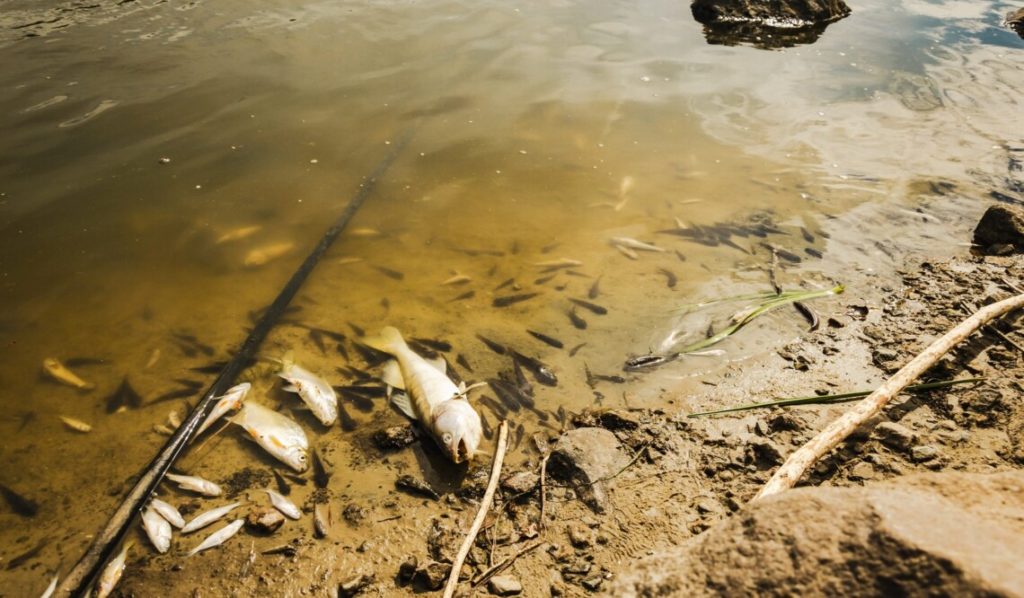Russia continues to carry out acts of ecocide in Ukraine, creating a threat of environmental catastrophe that could affect not only Ukraine, but also the entire Black Sea region. The latest incident with the pollution of the Seim River is another example of an ecological crime committed by Russia.
The pollution of the Seim and Desna Rivers was caused by Russia’s dumped sewage from a sugar factory in the town of Tiotkino, Kursk region. This incident led to a decrease in the oxygen level in the water and mass death of fish. As a result of the pollution, swimming, fishing and the use of water for domestic needs were banned in a number of settlements in Ukraine.
A sewage discharge from the sugar factory created significant environmental problems for the water bodies of the region. Mass death of fish and deterioration of water quality are consequences of the actions of the Russian enterprise. Local authorities continue to take measures to eliminate the effects of pollution and clean up the water bodies, but the risk of environmental disaster remains for the countries of the Black Sea region, where the Seim and Desna Rivers flow into.
The Seim River starts out from the Kursk region of Russia, flows through the Sumy region of Ukraine into the Desna, a tributary of the Dnieper, which in turn flows into the Black Sea. Thus, the pollution of the Seim poses a threat not only to Ukraine, but also to all countries of the Black Sea region. Harmful substances discharged into the Seim can spread through the river system, including the Dnieper, and reach the Black Sea, which can affect the water quality and health of marine ecosystems in coastal countries such as Turkey, Bulgaria, Romania and Georgia. Water pollution with hazardous chemicals can also lead to long-term consequences for the fisheries and tourism, key sectors of the economies of these countries.
This case of pollution of the Seim is not unique. Since the beginning of the full-scale invasion of Ukraine in 2022, Russian forces have systematically destroyed critical infrastructure, causing massive environmental damage. More than 20 % of Ukraine’s protected areas have already been damaged by the war. Damage to Ukraine’s water resources is estimated at almost €2 billion. Russia’s destruction of the Kakhovka Hydroelectric Power Plant has caused over €3.5 billion in damages.
The pollution of the Seim River is just one example of the many environmental crimes committed by Russia in Ukraine. The scorched earth tactics and targeted attacks on Ukraine’s ecosystems pose a direct threat to the ecology of the entire region. Russia’s actions are estimated to have caused over $57 billion in environmental damage, with some 5,300 documented cases of environmental crimes, of which 15 are being investigated as cases of ecocide. More than 280 cases of environmental war crimes have been recorded. Ukraine has become the first country in the world to collect evidence of ecocide in order to hold the Russian aggressor accountable.
These actions are a serious threat not only to Ukraine, but also to the entire Black Sea region. Potential pollution of the Black Sea waters could affect the health of millions of people, degrade water quality, and cause huge losses to the coastal economies.
The international community must pay attention to Russia’s ongoing acts of ecocide in order to prevent further environmental disasters. Russia’s regular actions to pollute the environment in Ukraine, such as dumping waste into water bodies, blowing up hydraulic systems, and polluting land, pose a threat not only to local ecosystems, but also to the ecological balance in Europe and worldwide. There is an urgent need to mobilize international efforts to stop such environmental crimes, ensure that those responsible are held accountable, and provide Ukraine with technical and financial assistance to eliminate the consequences of pollution. Only coordinated actions by the global community can prevent further environmental disasters and protect vital ecosystems from the destructive consequences of Russia’s aggressive policies.
Source: Far-bg

